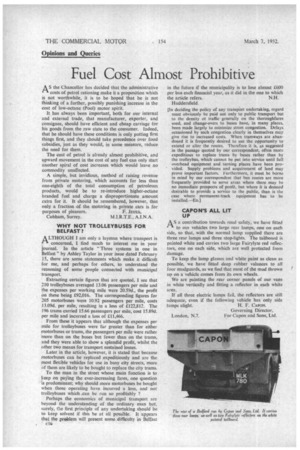Opinions and Queries
Page 54

If you've noticed an error in this article please click here to report it so we can fix it.
Fuel Cost Almost Prohibitive
A S the Chancellor has decided that the administrative .1-1. costs of petrol rationing make it a proposition which is not worthwhile, it is to be hoped that he is not thinking of a further, possibly punishing increase in the cost of tow-octane (Pool) motor spirit.
It has always been important, both for our internal and external trade, that manufacturer, exporter, and consignee, should have efficient and cheap carriage for his goods from the raw state to the consumer. Indeed, that he should have these conditions is only putting first things first, and they should take precedence over food subsidies, just as they would, in some measure, reduce the need for them.
The cost of petrol is already almost prohibitive, and upward movement in the cost of any fuel can only start another spiral of cost increases which would leave no commodity unaffected.
A simple, but invidious, method of raising revenue from private motoring, which accounts for less than one-eighth of the total consumption of petroleum products, would be to re-introduce higher-octane branded fuel and charge a disproportionate amount extra for it. It should be remembered, however, that only a fraction of the motoring in private cars is for
purposes of pleasure. F. JEWS,
Cobham, Surrey. M.1.R.T.E. A.I.N.A.
WHY NOT TROLLEYBUSES FOR BELFAST?
LTHOUGH I am only a layman where transport is 1-1..concerned, I find much to interest me in your journal. In the article "Three systems in one in Belfast" by Ashley Taylor in your issue dated February 15, there are some statements which make it difficult for me, and perhaps for others, to understand the reasoning of some people connected with municipal transport.
• .Extracting certain figures that are quoted, I see that 210 trolleybuses averaged 13.06 passengers per mile and the expenses per working mile were 20.59d., the profit on these being £92,016. The corresponding figures for 205 motorbuses were 10.92 passengers per mile, costs 13.09d. per mile, resulting in a loss of £122,812. The 196 trams carried 15.66 passengers per mile, cost 15.89d. per mile and incurred a loss of £11,466.
From these it appears that although the expenses per mile for trolleybuses were far greater than for either motorbuses or trams, the passengers per mile were rather more than on the buses but fewer than on the trams, and they were able to show a splendid profit, whilst the other two means for transport sustained losses.
Later in the article, however, it is stated that because motorbuses can be replaced .expeditiously and are the most flexible vehicles for use iii busy city streets, more of them are likely to be bought to replace the city trams.
To the man in the street whose main function is to keep on paying the ever-increasing fares, one question is predominant; why should more motorbuses be bought when those operating have incurred a loss, and not trolleybuses which .can be run so profitably ?
Perhaps the economics of municipal transport are beyond the understanding of the ordinary man but, surely, the first. principle of any undertaking should be to keep solvent if this be at all possible. It appears that the prcklalcm will present some difficulty in Belfast • c 16. in the future if the municipality is to lose almost £600 per bus each financial year, as it did in the one to which the article refers. N.H. Huddersfield.
[In deciding the policy of any transport undertaking, regard must obviously be paid not only to public transport but to the density of trafficgenerally on the thoroughfares used, and change-overs to buses have, in many places, been made largely to minimize street congestion. Delays occasioned by such congestion clearly in themselves may give rise to increased costs. When tramways are abandoned it is frequently desired to use the opportunity to extend or alter the routes. Therefore it is, as suggested in the passage quoted by our correspondent, often more expeditious to replace trams by buses rather than by the trolleybus, which cannot be put into service until full overhead equipment and turning places have been provided, Supply problems and acquirement of land may prove important factors. Furthermore, it must be borne in mind by our correspondent that bus routes are more frequently provided to serve areas where there may be no immediate prospects of profit, but where it is deemed desirable to provide a service to the public, than is the case where permanent-track equipment has to be installed.—ED.] CAPON'S ALL LIT UP A S a contribution towards road safety., we have fitted " to our vehicles two large rear lamps, one on each side, so that, with the normal lamp supplied there are three rear lamps and three stop-lights. The tailboard is painted white and carries two large Fairylyte red reflectors, one on each side, which are well protected from damage.
To keep the lamp glasses and white paint as clean as possible, we have fitted deep rubber valances to all four mudguards, as we find that most of the mud thrown up on a vehicle comes from its own wheels.
We are painting the rear corner panels of our vans in white vertically and fitting a reflector in each white area.
If all three electric lamps fail, the reflectors are still adequate, even if the following vehicle has only side
lamps alight. H. E CAPON.
Governing Director, London, N.7. For Capon and Sons; Ltd.




























































































